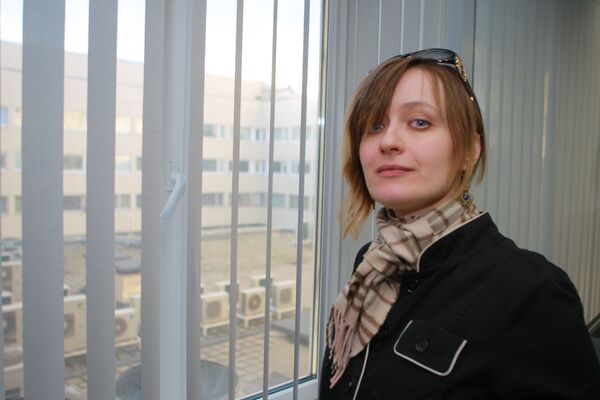Tatyana Ivanova was a St. Petersburg schoolteacher who didn’t want to participate in voter fraud during the December 2011 State Duma elections. This made her a star.
It also made her a target for election officials. One sued her for libel – and won. Well, at first, anyway, today Tatyana Ivanova was cleared.
In February this year, Ivanova told Novaya Gazeta journalists about actually being “trained” by officials on how to falsify votes. And what’s truly heartbreaking about her case is that she was forced to leave the school where she was teaching. Timid, cautious school officials, afraid for their jobs could not, apparently, stand by her during the scandal. It’s a tale as old as the world – the whistleblower breaks ranks and is punished for it – and yet it doesn’t get any less sad, somehow.
Following Vladimir Putin’s winning bid for the presidency in March, many of those who align themselves with the “creative class” lambasted “byudzhetniki” (people whose salaries and pensions are drawn from the state budget) like Ivanova. They were called cowards, serfs, and so on, because they were the ones, we were told, who had overwhelmingly voted for both Putin and the United Russia party.
Yet in Russia, power remains centralized and genuine political alternatives are thin on the ground. In this light, what’s interesting about Ivanova’s case is that she is no political crusader. She is simply a decent person who wanted an honest vote. In a country where the majority of people already have a politician they prefer, an honest vote would seem like no big deal, right? Yet the issue of voter fraud is largely a local one: officials are always after the “right” numbers for their precinct, fearing they may otherwise fall out of favor. And Ivanova fell victim to that old, Soviet, and yet still-thriving system that is primarily designed to keep bureaucrats gainfully employed.
Ivanova showed the courage that the “byudzhetniki” are accused of lacking. Not in the face of political persecution, but against something even more insidious, unconscious even: the desire to please. Please your bosses – and you will sleep better at night. Where’s the harm in it? You’re not actually hurting anyone. No one’s asking you to kill for them. It’s being done in the name of bureaucratic cohesiveness, not in the name of some “bloody regime.”
Ivanova’s case certainly shows that Russia has moved far beyond the Gulag days of Alexander Solzhenitsyn – but it’s not out of the woods yet. Strangers found it easy to support her from afar following the publication of her Novaya Gazeta interview, but as she later told journalists, many people she was actually close to turned away from her.
She had broken one of the taboos of her profession – schoolteachers are supposed to be pliant and agreeable. They are low-wage workers who are overburdened and frequently exhausted. They are also viewed as altruists who will do anything to keep their jobs – after all, for them, it’s considered a calling. Manipulating them should be easy, as easy as manipulating children.
And when they are not manipulated, it’s cause for anger. Who did she think she was, after all, this demure, middle-aged woman with her boyish haircut? Some teacher, that’s who!
Sources in the press say that Tatyana Ivanova is now slated to get a special human rights medal, called Hurry to Do Good. The medal’s name reminds me of a saying that was popular in the Soviet Union: “initiative is punishable.” But its real meaning is closer to “Don’t stick your neck out.”
But every once in a while, you have to stick your neck out. Particularly when you’re an authority figure to children who happen to trust you.
The views expressed in this article are the author's and do not necessarily represent those of RIA Novosti.
Trendwatching in Russia is an extreme sport: if you’re not dodging champagne corks at weddings, you’re busy avoiding getting trampled by spike heels on public transportation. Thankfully, due to an amazing combination of masochism and bravado, I will do it for you while you read all about it from the safety of your living room.
Natalia Antonova is the deputy editor of The Moscow News. She also works as a playwright – her work has been featured at the Lyubimovka Festival in Moscow and Gogolfest in Kiev, Ukraine. She was borxn in Ukraine, but spent most of her life in the United States. She graduated from Duke University, where she majored in English and Slavic Literature. Before coming to Moscow, she worked in Dubai, UAE and Amman, Jordan. Her writing has been featured in The Guardian, Foreign Policy, Russia Profile, AlterNet, et al.
Trendwatcher: The Boring Russians of Dubai
Trendwatcher: Destroying Football – for the Lulz
Trendwatcher: Lunching with the Enemy
Trendwatcher: The Moscow Grocery Shop of Horrors
Trendwatcher: Marrying Money - of Diamonds and Marital Rape
Trendwatcher: Modernizing Health Care – and Death Care
Trendwatcher: Is Dignity in Death Too Much to Ask?
Trendwatcher: Drunk at 200 km per hour



